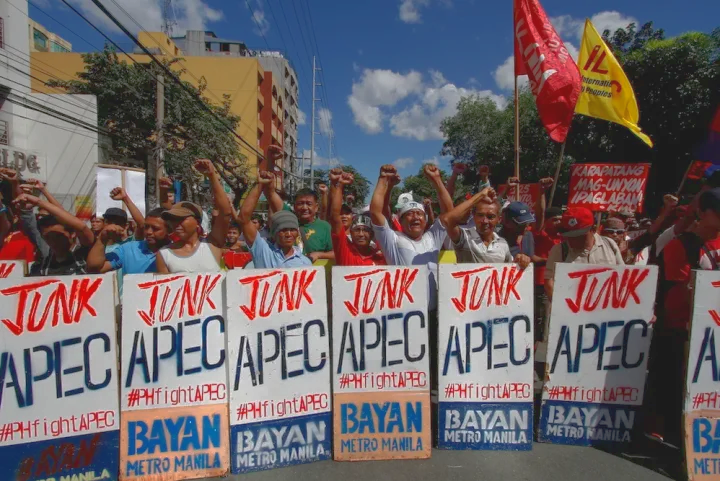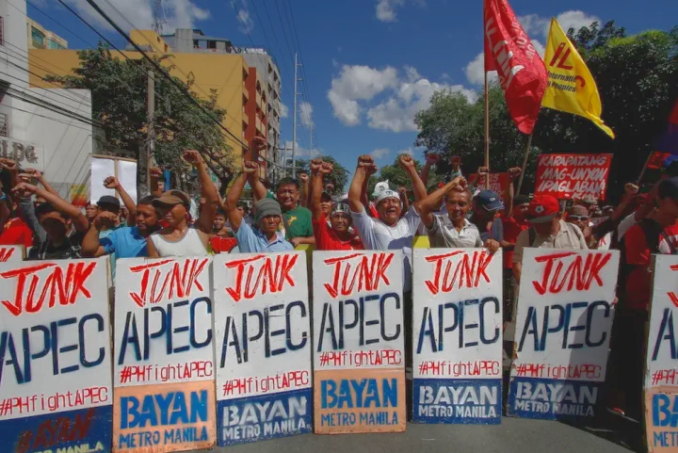

Community Alliance for Global Justice
Seattle
For the first time in over a decade, the Asia-Pacific Economic Cooperation (APEC) forum has been holding its meetings in the U.S., first in Palm Springs, California, in February and then in Detroit in May. It is now gearing up to meet in Seattle. Capitalist trade ministers will attend a series of meetings here from July 29 to Aug. 21.


Community Alliance for Global Justice. Manila, the Philippines, Nov. 19, 2015.
On their first two days, these ministers will confront a large mass of conscientious workers who will vehemently oppose their conference.* These workers are not deceived by APEC’s thin veneer of corporatist and neoliberal buzzwords and recognize it as a moving cog in brewing war plans and continued exploitation from the imperialist United States.
APEC − tool of imperialism
APEC was founded in 1989 as an intergovernmental forum and “free trade agreement” (FTA) among 12 original member states in the Asia-Pacific region. Today, APEC has a total membership of 21 countries, while excluding Laos and
the Democratic People’s Republic of Korea (North Korea). APEC functions in much the same way as similar organizations, such as the United States-Mexico-Canada Agreement (formerly NAFTA) or the Organization of American States, with less direct U.S. involvement but no less potential for U.S. capital to benefit.
From APEC’s inception, its meetings have been subject to huge protest mobilizations of the people — in the Republic of Korea (South Korea), Thailand, the Philippines and other host nations. Free trade agreements are a haunting and powerful framework and device deployed under neoliberal capitalism. Its deals often result in the poorer “developing” countries accumulating massive debt through loans and military sales, while chipping away at workers’ rights and working conditions worldwide through endless deregulation.
As transnational companies accumulate capital and the well-oiled neoliberal machine deregulates any barriers to accumulation, more free trade agreements are created. Despite the crippling debt this wreaks on countries exploited by such agreements, the imperialists receive their short-lived dopamine rush and crave more, gumming the works with bureaucratic and financial messes that strangle the rest of the world.
In 2020, a highly controversial and protested Asia-Pacific regional FTA which had been in negotiation since 2011, known as the Regional Comprehensive Economic Partnership (RCEP), was officially signed. It took effect in 2022. In May last year, President Joe Biden announced the Indo-Pacific Economic Framework for Prosperity (IPEF), something he ominously described as “writing the new rules for the 21st century economy.” IPEF members exclude China, North Korea and Laos. It has been heavily criticized for being such a clear, hawkish attempt at distancing the economies of the U.S. and China.
The United States’ hosting of APEC and the forming of IPEF coincide with the large-scale and long-term shifting of imperial momentum toward the Asia-Pacific region — in Uncle Sam’s own rhetoric, “a pivot to Asia.” This year has seen massive milestones on the path of that pivot, no doubt foreshadowing high tensions and warmongering at the upcoming conference. One major milestone, Gen. Michael A. “Mike” Minihan’s memo, sets the stage boldly.
Premeditated war with China?
On Feb. 1, the Department of the Air Force accidentally leaked a memorandum from Gen. Minihan, intended to be between commanders, which exposed his belligerency: “My gut tells me we will fight [China] in 2025. . . . We spent 2022 setting the foundation for victory. We will spend 2023 in crisp operational motion building on that foundation. . . . Drive readiness, integration and agility for ourselves and the Joint Force to deter, and if required, defeat China.” (airandspaceforces.com, Jan. 30)
Gen. Minihan revealed premeditation about this coming war, referring in his End State section of the memo to “a fortified, ready, integrated and agile Joint Force Maneuver Team ready to fight and win inside the first island chain.” Despite all the public relations the Air Force could muster to try to cover up the fallout from this leak from the horse’s mouth; it is clearly stated that Pentagon strategists regard China as the U.S.’s main enemy and have developed plans to wage war with Beijing in the near future.
With that in mind, workers and communists must look to the Asia-Pacific region with a vigilant eye for the strings that Washington and its allies are currently pulling. In February, an Enhanced Defense Cooperation Agreement went into effect, announcing five new U.S. military bases in the Philippines: Cesar Basa Air Base, Fort Magsaysay Military Reservation, Lumbia Air Base, Antonio Bautista Air Base and Mactan Benito Ebuen Air Base.
In April, the agreement added four more: Naval Base Camilo Osias, Camp Melchor Dela Cruz, Balabac Island and Lal-lo Airport. This massive and quick militarization and mobilization of the Pentagon budget is aimed at increasing U.S. readiness and agility to strike or surround China.
On March 13, the AUKUS (Australia, Britain, U.S.) military alliance tightened its noose, announcing an arrangement to supply Australia with a nuclear-powered submarine. The White House public statement stressed that Australia would not be allowed to repurpose the submarine to carry a nuclear explosive device and that Australia should not seek to enrich any uranium or try to acquire any nuclear weapons.
Nuclear subs and semiconductors
Despite these public denials, a nuclear-powered submarine armed with Tomahawk cruise missiles and torpedoes is still a very dangerous weapon, and it has arrived in the Asia-Pacific region. On June 16, another nuclear-powered submarine arrived in Busan, South Korea. The pretext for its delivery was missile tests conducted by North Korea.
The economic resources most at stake in these brewing war plans are semiconductors, the vast majority of which are manufactured at the Taiwan Semiconductor Manufacturing Company. U.S. strategists say they will keep the company under U.S. control and as detached from China as possible. They even worked out a deal during former Speaker of the House Nancy Pelosi’s 2022 visit to Taiwan for a TSMC factory in Arizona.
The phrase “semiconductors are the new oil” has popped into public discourse in the corporate media, and Washington’s rhetoric towards Taiwan has been about increasing military buildup. Wisconsin Republican Rep. Mike Gallagher flat-out said, “We need to arm Taiwan to the teeth right now.” (Defense News, May 24)
In conclusion, the U.S. has established nine new bases in the Philippines in less than six months, even as its military pacts moved high-value weaponry to Australia and South Korea — both countries a ballistic stone’s throw away from China. Politicians’ and corporate media’s rhetorical focus is on Taiwan and its semiconductors, coupled with preemptively establishing semiconductor production within U.S. borders.
Together these are a clear sign that Washington is fortifying its offensive capabilities in the Asia-Pacific region, reshuffling the chessboard, while spinning and strewing economic chokeholds and jingoistic webs around China — in preparation for a coming war.
But the working class in the U.S. wants no part of imperialist war! These kinds of wars lower wages, inflate prices, hike up the cost of fuel and take humanity far too close to the brink of extinction with nuclear threats. The only war of use to the workers is a class war against the capitalists who oppress and exploit them.
*Join Workers World Party, the International League of Peoples’ Struggle, the Resist U.S.-Led War Movement, Anakbayan, People Over Profit and many other comrades at the Peoples’ Summit Against APEC in Seattle this July 29-30! Go to tinyurl.com/3drz5r96 to register.
This statement was recently issued by over 30 groups. On Friday, March 28, Dr. Helyeh…
By Jeri Hilderley I long for peace and ease as stress and anxiety overtake me.…
Los siguientes son extractos de la declaración del Gobierno de Nicaragua del 9 de abril…
The following are excerpts from the statement of the Nicaraguan government on April 9, 2025,…
The following is a statement from the organization Solidarity with Iran (SI) regarding the current…
By Olmedo Beluche Beluche is a Panamanian Marxist, author and political leader. This article was…